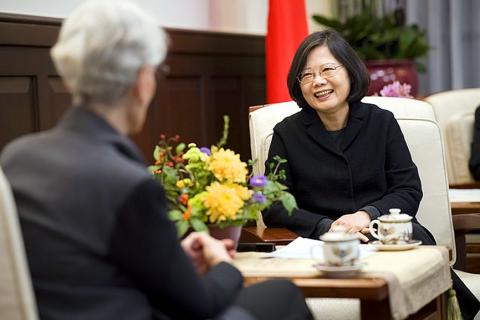President Tsai Ing-wen (蔡英文) yesterday urged unity across political lines against China as Sao Tome and Principe broke diplomatic ties with Taiwan.
The African nation’s decision to terminate ties with Taiwan, as well as changes in the international situation, pose a major challenge to Taiwan diplomatically, Tsai said at a meeting of the Democratic Progressive Party’s (DPP) Central Standing Committee at the party’s headquarters in Taipei.
“At a time of change, national solidarity across party lines is increasingly needed to fight against foreign forces,” DPP spokesman Yang Chia-liang (楊家俍) quoted Tsai as saying. “China has never stopped suppressing Taiwan’s international participation and diplomatic efforts.”

Photo: courtesy of the Presidential Office
China is behind a series of diplomatic setbacks Taiwan has faced, including the Gambia’s decision to sever diplomatic ties in 2013, the disrespectful treatment former president Ma Ying-jeou (馬英九) was subject to in Malaysia last month and Sao Tome and Principe’s announcement yesterday, Tsai said.
“As those incidents clearly suggest, China’s intervention occurs regardless of which party is in charge of the [Taiwanese] government,” she said.
China’s diplomatic isolation of Taiwan is directed against the entire population instead of specific political parties, Tsai said, adding that such practices are counterproductive to long-term cross-strait development and alienate Taiwanese.
In face of these challenges, the government must adopt a pragmatic diplomatic policy to broaden the scope of the nation’s international cooperation and improve Taipei’s relations with other nations on a mutually beneficial basis, she said.
Since Tsai was inaugurated in May, it has been the government’s top priority to increase the nation’s global presence and re-evaluate the unfair treatment the nation has been subject to, Tsai said, reiterating that the nation would not ease its diplomatic efforts.
“While divergence and conflict are common between the ruling and opposition parties, it is time we united against foreign forces to protect the national interest,” Tsai said.
Presidential Office spokesman Alex Huang (黃重諺) said Tsai met with government officials at noon to respond to the incident.
The participants included National Security Council Secretary-General Joseph Wu (吳釗燮), Premier Lin Chuan (林全), Minister of Foreign Affairs David Lee (李大維), Mainland Affairs Council Minister Katharine Chang (張小月) and central bank Governor Perng Fai-nan (彭淮南).
Huang said the president issued three instructions following the meeting: it is unnecessary for Taiwan to engage in “checkbook diplomacy” and it should maintain its stance of assisting diplomatic allies based on the principles of equality, reciprocity and mutual prosperity; that Beijing’s attempts to limit Taiwan’s international participation cause damage to the global community and cross-strait development; and finance-related government agencies should closely monitor the stock market in the aftermath of the break.
Additional reporting by CNA

Auckland rang in 2026 with a downtown fireworks display launched from New Zealand’s tallest structure, Sky Tower, making it the first major city to greet the new year at a celebration dampened by rain, while crowds in Taipei braved the elements to watch Taipei 101’s display. South Pacific countries are the first to bid farewell to 2025. Clocks struck midnight in Auckland, with a population of 1.7 million, 18 hours before the famous ball was to drop in New York’s Times Square. The five-minute display involved 3,500 fireworks launched from the 240m Sky Tower. Smaller community events were canceled across New Zealand’s

The Ministry of Foreign Affairs (MOFA) yesterday said it is closely monitoring developments in Venezuela, and would continue to cooperate with democratic allies and work together for regional and global security, stability, and prosperity. The remarks came after the US on Saturday launched a series of airstrikes in Venezuela and kidnapped Venezuelan President Nicolas Maduro, who was later flown to New York along with his wife. The pair face US charges related to drug trafficking and alleged cooperation with gangs designated as terrorist organizations. Maduro has denied the allegations. The ministry said that it is closely monitoring the political and economic situation

‘SLICING METHOD’: In the event of a blockade, the China Coast Guard would intercept Taiwanese ships while its navy would seek to deter foreign intervention China’s military drills around Taiwan this week signaled potential strategies to cut the nation off from energy supplies and foreign military assistance, a US think tank report said. The Chinese People’s Liberation Army (PLA) conducted what it called “Justice Mission 2025” exercises from Monday to Tuesday in five maritime zones and airspace around Taiwan, calling them a warning to “Taiwanese independence” forces. In a report released on Wednesday, the Institute for the Study of War said the exercises effectively simulated blocking shipping routes to major port cities, including Kaohsiung, Keelung and Hualien. Taiwan would be highly vulnerable under such a blockade, because it

UNRELENTING: China attempted cyberattacks on Taiwan’s critical infrastructure 2.63 million times per day last year, up from 1.23 million in 2023, the NSB said China’s cyberarmy has long engaged in cyberattacks against Taiwan’s critical infrastructure, employing diverse and evolving tactics, the National Security Bureau (NSB) said yesterday, adding that cyberattacks on critical energy infrastructure last year increased 10-fold compared with the previous year. The NSB yesterday released a report titled Analysis on China’s Cyber Threats to Taiwan’s Critical Infrastructure in 2025, outlining the number of cyberattacks, major tactics and hacker groups. Taiwan’s national intelligence community identified a large number of cybersecurity incidents last year, the bureau said in a statement. China’s cyberarmy last year launched an average of 2.63 million intrusion attempts per day targeting Taiwan’s critical